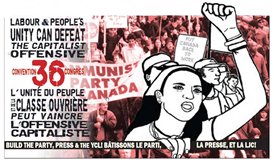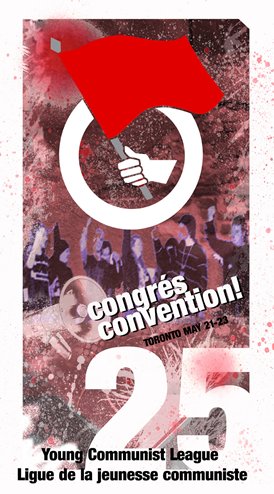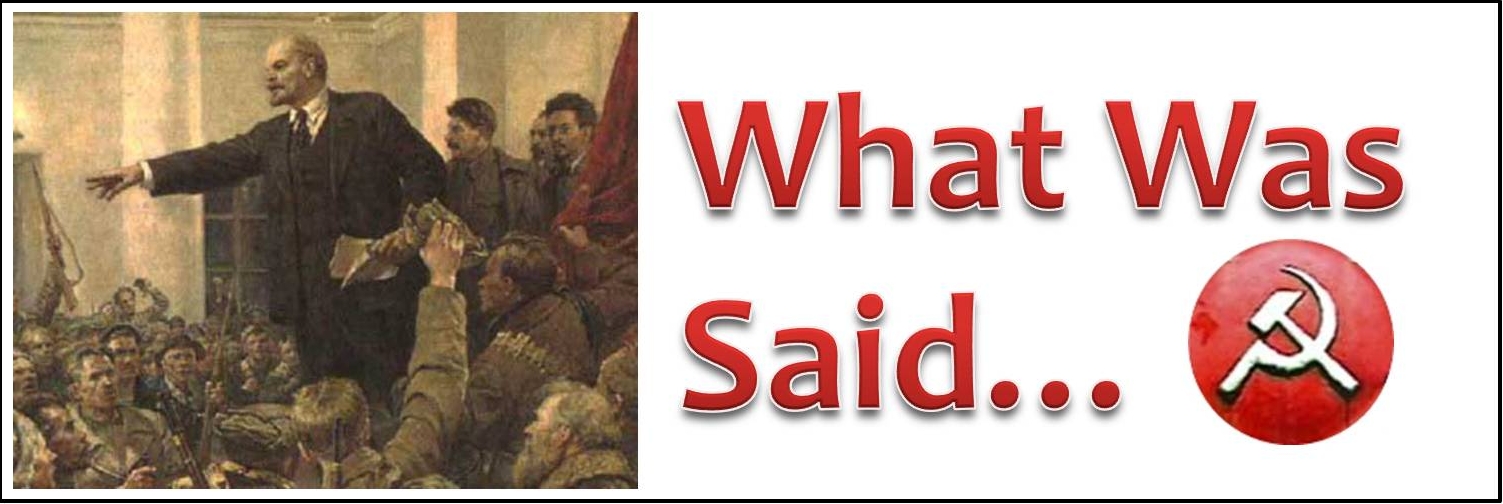
Election 2008
   Â
Â
Lebanese CP - Monthly Bulletin No. 11
G8/G20 Imperialist Summit Toronto, ON June 26, 2010
Police Charge Patriotic Canadian Youth
30,000 Say Yes to Peace! No to NATO!
Lisbon Nov.21, 2010
The Latest From FOS:
- International
The Way I See It - Afghanistan Revisited

Those of us who support CPA, including the members of CPS assert that anti-Sovietism was and continues to be pro-war and anti-peace. During the darkest days of the cold-war when the threat of nuclear war loomed over the planet, the Soviet Union was the main force of restraint over the worst of the US imperialist reactionary forces thirsting for war.
Read more...
- Marxism-Leninism
Proposal for a New International

The proposal last November 2009 to organize a new international having the support of left-socialist revolutionary parties in Latin America, on the initiative of Hugo Chavez, is an important development in the anti-imperialist movement urgently in need of credible communist analysis.
Read more...
- Federal Politics
Prime Minister Harper (Assisted by Jim Flaherty and Peter Van Loan) Leads the Whole World Forward To the New âEnlightened Sovereigntyâ of the 21st Century

Prime Minister Harperâs address to the World Economic Forum (WEF)[1] in Davos Switzerland January 28, 2010 canât be dismissed as just unctuous and vapid; it was worse than that. Â Harper adopting his familiar and grating patronizing manner underwhelmed the elite audience of capitalist intellectual luminaries, by suggesting that minority Conservative Government economic policies under Harperâs leadership is the example the nations of the world must follow to emerge triumphant from the worst capitalist depression since the market crash of October 1929.
Read more...
- Federal Politics
Organized Labour and the Politics of the Class Struggle Today

A Convention of the Communist Party of Canada (CPC) is always a significant event in the struggle of the working class to defeat capitalism and replace it with socialism. Â Only the Communists strive to take responsibility for the whole revolutionary process underway in our own country and globally. Â Every revolutionary class conscious worker is concerned that the Communist Party becomes strengthened and more effective in fulfilling its historic responsibilities to the working class of Canada and all of its peoples and for the victorious outcome of the cause of the International Communist Movement.
Read more...
- Federal Politics
The Way I See It! - Some Critical Comments

The main link that can move the entire political process forward is a clearly articulated and unambiguous revolutionary working class program to confront US-Canadian corporate power and its stranglehold on Parliament, the State, the military and the economy. That task must be the main theme of the upcoming 36th Convention of the Communist Party of Canada (CPC). From the convention an appeal that reaches out to all of organized labour and the democratic forces of our country with a plan to unite electorally to defeat Harper, and decisively, will be influential within labour and garner widespread appeal with Canadian workers. That is a concentration task and if it is solved, the organizational tactics to achieve it can be worked out.
Read more...
Polls
Have you read the CPC 36th Convention Draft Main Resolution?
What Was Said
V.I. Lenin State and Revolution â 1916 â Volume 25 page 410 Progress Publishers Moscow 1964.
âImperialism â the era of bank capital, the era of gigantic capitalist monopolies, of the development of monopoly capitalism into state monopoly capitalism â has clearly shown an extraordinary strengthening of the âstate machineâ and an unprecedented growth in its bureaucratic and military apparatus in connection with the intensification of repressive measures against the proletariat both in the monarchial and in the freest, republic countries.â
VI Lenin - Imperialism, the Highest Stage of Capitalism
âAs long as capitalism remains what it is, surplus capital will be utilised not for the purpose of raising the standard of living of the masses in a given country, for this would mean a decline in profits for the capitalists, but for the purpose of increasing profits by exporting capital abroad to the backward countries.â

Â
News
and Statements from:
The Communist Party of Canada

Communist Party of Canada May Day Statement 2010
Unite to Demand a People's Recovery!
The corporateâowned mass media greet us daily with upbeat economic reports about how the global economic crisis is over and that ârecovery is now well underwayâ. This is all very comforting, but itâs also a gross perversion of the truth.
In reality, there is no recovery for most working people in this country. Unemployment and job insecurity remain high, with over 1.5 million (8.2%) out of work according to official statistics; real unemployment is closer to 12%. Since 2003, more than half million wellâpaying manufacturing jobs been wiped out, 290,000 in the past two years alone. Soon EI benefits will be running out for hundreds of thousands of these unemployed workers.
Nor is there any recovery for young people trying to find work or to complete their education. Or for Aboriginal peoples who continue to suffer systemic joblessness and grinding poverty. Or for new immigrants and their families trying to build a better life. Or for pensioners and others on fixed income.
So what kind of recovery is this? Itâs a recovery for the profits of the biggest banks and corporations, and for those who own and control them.
The Communist Party of Canada has issued the Main Political Resolution coming out of the 36th Central Convention February 2010. Canadians for Peace and Socialism will be commenting on the document in the coming weeks and months. It is an essential document for all workers to read, discuss and distribute.
Â
From the Keynote Address to the 36th Central Convention by Comrade Miguel Figueroa:
Â
âThe second and final point I wish to make refers to the centrality of our theoretical and ideological work. Of course, we have a clearly delineated theoretical perspective and world-view â Marxism-Leninism â which is reflected in our Party program, our strategy & tactics, and our daily work as Communists. We all remember Leninâs famous dictum: âwithout revolutionary theory, there can be no revolutionary movementâ. But the theoretical basis of our Party â and that of the Communist movement internationally â can never be neglected or taken for granted, for without its constant development and application to ever-changing conditions, our theoretical basis, and with it our movement itself, would wither and perish.
Â
"As important as this question always is, it could rightly be argued that it is even more critical today, for it is undeniable that as the class struggle intensifies, so too does the ideological struggle â the âbattle of ideasâ â sharpen. It is hardly coincidental that it is precisely now, when the crisis of capitalism is deepening, that we witness an increased ideological offensive from our class adversary in the form of a revival of anti-communism, âphilosophicalâ attacks on the concept of socialism, and crude attempts to falsify or re-write the history of our movement in Canada and around the world.
CPC 36th Central Convention Main Political Resolution
Â
Build Solidarity with the Striking Sudbury Miners
at Vale Inco
March 5, 2010
Read...
Â
Militant May Day Greetings 2010
April
30, 2010
Read...
Rebel Youth Magazine Blog:
75,000 Quebec Workers March!
March 20, 2010
A few days after the expiry of collective agreements for employees of public and parastatal sectors, thousands of people, members and friends of the Common Front SISP-CSN-FTQ from all regions of Quebec, marched in the streets of Montreal to remind the government that the solutions to improve public services go through the negotiation.
Â
Speech by Johan
Boyden, YCL-LJC General Secretary
To the 36 Central Convention Communist Party of Canada
Three years ago, the YCL stood at this podium giving greetings on the eve of our re-founding convention. New delegates may not know this, but in a deliberate and calculated attempt to attack the Communist Party of Canada thirty years ago, a campaign was initiated to destroy, terminate, liquidate the revolutionary youth around the Party. Some members who fought against that attack are here today.
Â
25th Central
Convention of the YCL-LJC
September 24-26, Toronto ON
DISCUSSION BULLETIN #1
DISCUSSION BULLETIN #2
DISCUSSION BULLETIN #3
 YCL Central Convention Announcement
June 23, 2010
NEW DATES : September 24-25-26
Dear comrades and friends,
As you no doubt have heard, due to unexpected circumstances the Central Committee of the YCL-LJC was forced to postpone our 25th Convention, originally scheduled for May. We are now pleased to announce the new dates of the convention: Friday September 24 to Sunday September 26, to be held in Toronto. We are re-issuing the original convention call, below, which can also be found online, together with registration.
The Central Committee encourages all clubs and members to continue to meet this summer to discuss the main documents, the pre-convention discussion, and nominate delegates. As we enter an extended period of ideological mobilization, clubs and committees should compare their concrete political realities of struggle with the framework of the main convention documents and deepen discussion of the documents.
We also encourage all clubs and committees of the YCL-LJC to re-enforce their activities building the convention financially, organizationally and politically, and to broaden and deepen our engagement with friends and allies regarding the convention.
The Central Committee has struck a special committee to review and discuss the YCL-LJC Constitution as an additional item of business for the Central Convention. The committee will be reporting by early September as a special discussion bulletin.
The deadline for convention discussion bulletin #4 is July 1, 2010.
With the additional time to organize, let's make this convention an exciting moment for the YCL-LJC and the youth struggle!
In
solidarity and comradeship,
Â








